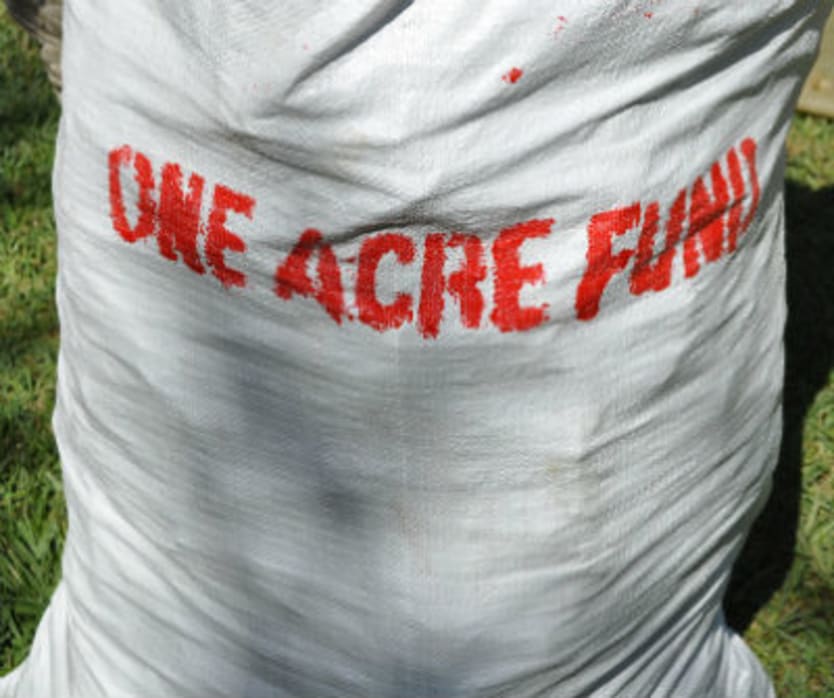
At a time when public sector resources are limited, and every philanthropic dollar must go further, there is a robust debate in the international development community about how to achieve development goals with less money. To succeed in a resource-constrained environment, development practitioners should learn from a group that is adept at delivering cost-effective products and services at scale: private-sector corporations.
I work for a nonprofit called One Acre Fund that serves smallholder farmers, the largest group of poor people in the world. Our typical client is a woman farmer with five children, two acres of land, and a history of food insecurity. She is unable to grow enough food on her land to feed her family, and each year, lives through a hunger season, the several months between the end of the old harvest and the arrival of the new.
Though it may seem counterintuitive, we help farmers increase their incomes with an operating model that requires them to pay for all the products and services they receive from us. We are a nonprofit, but in practice, we operate exactly like a business. This is a deliberate choice, and we believe that it is why we’ve been able to grow to serve 130,000 smallholder farmers in East Africa since we started in 2006.
We operate like a private-sector organization for several reasons.
First, it aligns our incentives as an organization with those of our clients: smallholder farmers. Among other services, we offer farmers seed and fertilizer through a loan program. One Acre Fund succeeds as an organization when our clients repay those loans.
Therefore it’s in our organizational interest to listen to our clients and offer them high-quality customer service, whether that means making sure they receive their seed and fertilizer in time for planting, or verifying that they are using the best planting technique in their fields. When our farmers have great harvests, they repay their loans, and come back for future loans. If farmers choose not to repay, we know that we have an operational problem that needs to be solved.
By contrast, if we were a nonprofit that gave away seed and fertilizer to farmers for free, we’d likely measure our success by how many farmers received our donations. We’d be less concerned about whether those farmers used the inputs correctly. In fact, we’d probably invest most of our time into reaching as many farmers as possible and very little time on making sure farmers raised good harvests.
Operating like a business also creates a robust feedback loop between One Acre Fund’s farmers and staff that allows for constant improvement to our operating model. Because our clients are customers who pay for the services they receive, they are empowered to tell us exactly what they think of those services.
If farmers think there is a problem with the quality of their seed, they tell us immediately. When farmers are interested in receiving financing for a new crop or product, they tell their field officers, and we consider adding that product to our research and innovation pipeline.
One Acre Fund field staff have one-on-one conversations with thousands of farmers every week. The farmers’ frank input and feedback makes its way up to our senior field leadership, who can adjust operations accordingly.
For instance, if many farmers tell their field officers that they didn’t understand a particular training session, we’ll revise the training session and deliver it again. After vocal feedback from our clients in Rwanda, we decided to discontinue a funeral insurance product.
Operating like a business also allows us to build an organization that is financially sustainable. We currently cover about 80 percent of our field operating costs through farmer loan revenue, and aim to cover 100 percent of operating costs in our Kenya and Rwanda operations within the next four years.
As a financially sustainable organization, we have the ability to grow and eventually reach more of the millions of smallholder farmers who could benefit from our services. We’re also creating a group of customers who are accustomed to paying market prices for agriculture goods and services, which benefits the overall agriculture sector.
Large corporations like McDonalds and Starbucks build operating units that can be easily replicated for rapid scale-up. One Acre Fund is one of the few nonprofit organizations that aspire to do the same.
As we search for ways to maximize the impact of every dollar spent on development, development practitioners should think about building the McDonalds of public health, or the Starbucks of clean water delivery. Applying private-sector business principles to development aligns the incentives of nonprofits and their clients, dignifies the poor as customers, and creates sustainable development outcomes.
Explore related content
Join the 500,000-strong Devex community to network with peers, discover talent and forge new partnerships – it’s free! Then sign up for the Devex Impact newsletter to receive cutting-edge news and analysis every month on the intersection of business and development.








